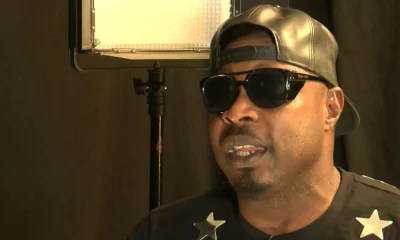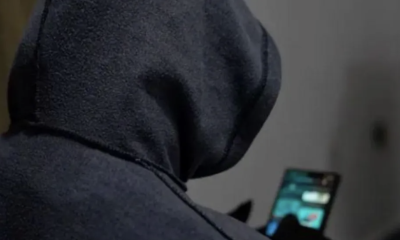Investigations
Nigerian Women Trafficking Mafia Exposed

Nigerian women made up the largest share of African trafficking victims at 61 percent with most forced into prostitution.
Last year 41 suspected Nigerian traffickers were also caught, roughly twice as many as in 2017, according to the Germany’s Federal Criminal Police Office. Numerous secret societies run the smuggling and authorities say they’re increasingly violent.
One of Germany’s largest red-light districts is Vulkan Street in Duisburg, a northwest German city and former industrial stronghold. A growing number of Nigerian women are ending up here, and Nigerian human traffickers are responsible for smuggling in most of them, says Barbara Wellner of Solidarity with Women in Distress (Solwodi).
The organization helps victims of human trafficking and forced prostitution. Wellner says many of these women are disadvantaged, young, have received barely any schooling, and have just a single parent or no parents.
Such vulnerable women often fall into the hands of traffickers in Africa and get passed along a far-reaching network until they eventually land in Germany. There, they often end up with so-called “madams,” women who pimp them out. Before heading to Europe, these women are told that their journey will be costly, but that this won’t be a problem, since they’ll make good money in Europe.
To place more pressure on the young women to pay up once they’re in Europe, a juju spell from the West African magical tradition is often cast upon them. This can often be accompanied by ritualistic animal slaughter and the drinking of its blood. The women are then forcefully and repeatedly told that their relatives will die or become ill if they fail to repay their debt or tell anyone of this arrangement. Once on European soil, these women often find that prostitution under the “madams” is the only way for them to earn the money that they owe.
In 2018 German police registered 68 women who were the victims of Nigerian human traffickers — a significant rise on the previous year.
In 2012 Germany joined the EU’s ETUTU project, which in cooperation with Nigerian authorities aims to crack down on Nigerian criminals trafficking humans around the world. A transnational approach to fighting these criminal is absolutely essential, as most Nigerian women arrive in Europe via Italy.
A new ‘Nigerian mafia’
Over the past three years, over 20,000 Nigerian women, many of them minors, have come to Italy via the Mediterranean. The UN estimates that some 80% are victims of human trafficking or are at great risk of becoming a victim.
Helen Okoro was once a victim of human traffickers. She arrived in Italy 20 years ago and lives there today. She works for Casa Agata, a Catholic women’s shelter, in the Sicilian city of Catania. So many women ask the shelter for help that its workers can barely keep up. Okoro has seen human trafficking change over the past years. She says she is alarmed by how brutal and professional human traffickers have become.

Some Sicilians are starting to refer a new “Nigerian mafia.” Yet unlike the Italian mafia, both perpetrators and victims are from abroad and often live on the fringes of society. Some Sicilian journalists accuse Italian authorities of not cracking down hard enough on these trafficking organizations.
However, public prosecutor Lina Trovato rejects this accusation. She says authorities have been monitoring the activities of Nigerian organized crime networks for a while. She explains that Nigeria’s so-called “new mafia” is not a single coherent unit but is instead compromised of numerous secret societies and criminal gangs, such as the so-called Black Axe, Vikings or Supreme Eiye Fraternity.

In Nigeria, the National Agency for the Prohibition of Trafficking in Persons (NAPTIP) is out to catch human traffickers, too. Daniel Atokolo, who heads the NAPTIP branch in the metropolis Lagos, says the traffickers are increasingly brutal.
According to Atokolo, efforts to dispel juju superstition among West Africans mean the madams in Europe now mainly resort to violence, instead of the psychological pressure of spells, to control the young women forced into prostitution.
Atokolo says that the secret societies active in Europe today, commonly referred to as the Nigerian mafia,
“Are no longer out to psychologically condition their victims with magic spells. They now use sheer terror. There is a clear relationship between the decrease in juju spells and the stronger presence of these gangs, who demand total obedience from their victims.”

More than 50 secret societies now operate in Nigeria, with influential lawmakers and businessmen supposedly among their members. Little is known about their organizational structure.
John Omoruan is a former high-ranking Black Axe member. He says he’s repented and he regrets his past actions.
However, he accuses Europe of being a large part of the problem behind human trafficking. Omoruan says it’s Europe that wants cheaper, younger prostitutes:
“At the end of the day, it’s a question of money. Europe is hungry for prohibited things like drugs, underage prostitutes, everything that’s forbidden. As long as this demand persists, secret groups like Black Axe and others will continue to be successful and make lots of money.”
Via DW By Jan-Philipp Scholz and Andrea LuegKenya Insights allows guest blogging, if you want to be published on Kenya’s most authoritative and accurate blog, have an expose, news TIPS, story angles, human interest stories, drop us an email on [email protected] or via Telegram
-

 Grapevine2 weeks ago
Grapevine2 weeks agoAlleged Male Lover Claims His Life Is in Danger, Leaks Screenshots and Private Videos Linking SportPesa CEO Ronald Karauri
-

 Grapevine1 week ago
Grapevine1 week agoRussian Man’s Secret Sex Recordings Ignite Fury as Questions Mount Over Consent and Easy Pick-Ups in Nairobi
-

 Investigations5 days ago
Investigations5 days agoMulti-Million Dollar Fraud: Three Kenyans Face US Extradition in Massive Cybercrime Conspiracy
-

 Economy4 days ago
Economy4 days agoIran Demands Arrest, Prosecution Of Kenya’s Cup of Joe Director Director Over Sh2.6 Billion Tea Fraud
-

 Investigations2 weeks ago
Investigations2 weeks agoEpstein’s Girlfriend Ghislaine Maxwell Frequently Visited Kenya As Files Reveal Local Secret Links With The Underage Sex Trafficking Ring
-

 News3 days ago
News3 days agoTHE FIRM IN THE DOCK: How Kaplan and Stratton Became the Most Scrutinised Law Firm in Kenya
-

 Business5 days ago
Business5 days agoA Farm in Kenya’s Rift Valley Ignites a National Reckoning With Israeli Investment
-

 Business2 weeks ago
Business2 weeks agoM-Gas Pursues Carbon Credit Billions as Koko Networks Wreckage Exposes Market’s Dark Underbelly




























